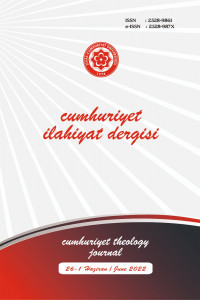Tarımsal Üretim Problemlerinin Çözümünde Dini Tutum ve Davranışların Analizi
An Analysis of Religious Attitudes and Behaviors in Solving Agricultural Production Problems
Author(s): Bahset Karslı, Süleyman KaramanSubject(s): Agriculture, Behaviorism, Rural and urban sociology, Sociology of Religion
Published by: Cumhuriyet Üniversitesi İlahyat Fakültesi
Keywords: Sociology of Religion; Farming; Structural Equation Model; Religious Attitude; Agricultural Production Problems;
Summary/Abstract: This study aims to analyse the effect of religious attitudes and behaviour of farmers engaged in rural life and agricultural activities on the solution of agricultural problems in the sample of Antalya. The religious mentality of the farmers through their actions and attitudes have been analysed in the context of agricultural perceptions, agricultural production problems and religious attitudes scales. The religious mentality in the solution of agricultural production problems is a subject that is dealt with in connection with the social problems and attitudes that develop over the change of agricultural activities. Farming, which has undergone a structural transformation with technological changes, is experiencing its most difficult period in the production-health equation today. Seed improvement, soil analysis, spraying in the production process has been moved from the traditional form to the modern form; this situation has created a trust problem for the product and the producer. In our study, which focuses on the question of "What is the effect of religious attitudes on the solution of agricultural production problems?", the data have been obtained through face-to-face interviews with the farmers of Antalya and three scales have been developed as agricultural perception, agricultural production problems and religious attitudes. While the scale of agricultural perception is handled in three aspects through the farmers' perceptions of land, profession and technology; the scale of religious attitudes is discussed in four aspects through fate, folk beliefs, traditional practices and fiqh rules. The scale of agricultural production problems is discussed as one-dimensional. Data collected through each of these three scales has been analysed with the help of standard deviation and mean and structural equation modelling (SEM) techniques. Within the framework of the structural equation model, four hypotheses have been developed and these hypotheses have been tested. A significant relationship has been found and predicted in all of the hypotheses put forward on the basis of the structural equation model. According to these results, the perception of fate explains 17% of the variance in the perception of agriculture and 12% of the variance in the perception of religious attitudes. Perception of agriculture as other predictor variables explains 31% of the variance in ethical problems while perception of religious attitude explains 6% of the variance in ethical problems. Based on the findings, it can be said that the perception of fate in farmers significantly predicts the perception of agriculture and religious attitude, and these two variables separately have a significant predictive effect on ethical problems. The perception of fate comes first among the religious mentality associated with the structural equation model in solving the problems that arise in the agricultural activity and production process. In the perception of fate, farmers always form a mental bond with the sacred in the sense of holding on to a religious ground against uncertainty and sometimes helplessness. Although agricultural activities have undergone structural transformations, they are not independent of nature and climatic conditions. It can be said that the high sensitivity of farmers in their perception of agriculture is due to the necessity of this religious ground and daily reality. In particular, the mentality produced for the perception of agriculture, which has sub-dimensions such as the perception of fate, land, profession and technology, has religious contents. In this sense, the land is perceived as a trust made by God with a religious content, as well as being a property that allows farmers to earn their livelihood. Again, it contains religious foundations based on the role that farming as a profession plays for the history of humanity with ancient foundations. But all these religious references are perceived as an incentive for the development of both the profession and agricultural activities, rather than creating a resistance against the renewal of agricultural activities technologically. The religious ground that exists on the basis of the perception of fate, as well as , folk beliefs, traditional practices and fiqh rules, affects the subdimension religious attitude perceptions. Perceptions of agriculture and traditional practice, on the other hand, have been measured to offer religious content to agricultural production problems that meet with social life in both farming and the profession. This relationship, in addition to providing a reference to the solutions to be produced for existing problems, can also be a source for policies regarding the human element in the farming profession, as it is in every business. Our study differs from agricultural activities and rural life studies in that it aims to determine the dimensions of the religious ground, to connect these dimensions with agricultural production problems, and to provide an infrastructure for the solution of agricultural production problems in the context of the structural equation model. In the study, it is aimed to explore the religious ground in the solution of production process problems and the predictive dimensions of fate, agricultural perception, religious attitude and agricultural production problems with a holistic perspective. The religious ground in the production problems that arise in the agricultural production process, on the other hand, has been measured by judgments that have content such as religion, genetics, nature, the hereafter, chemical spraying, health, seeing the reward in life, moral consistency. We can say that another specific point that distinguishes the study from other studies is to produce content for the religious awareness of the producer, which is neglected in solving the problems in agricultural production.
Journal: Cumhuriyet İlahiyat Dergisi
- Issue Year: 26/2022
- Issue No: 1
- Page Range: 153-172
- Page Count: 20
- Language: Turkish

